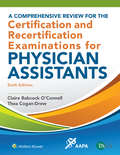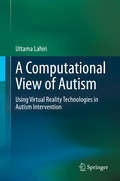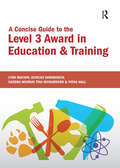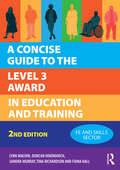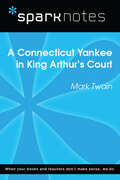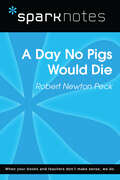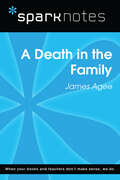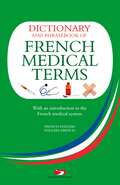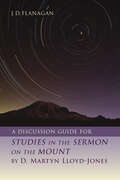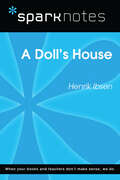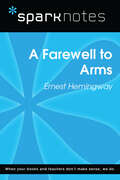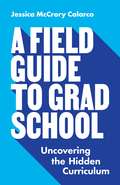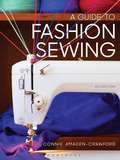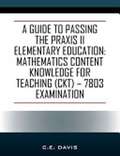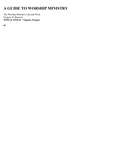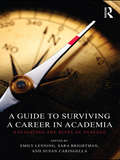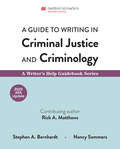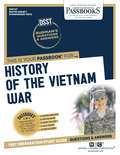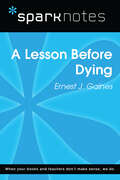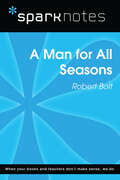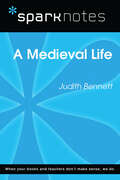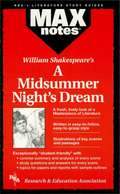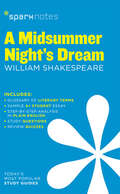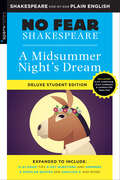- Table View
- List View
A Comprehensive Review for the Certification and Recertification Examinations for Physician Assistants: In Collaboration With Aapa And Paea
by Claire O'ConnellPrepare for PANCE or PANRE with the most trusted review tool, A Comprehensive Review for the Certification and Recertification Examinations for Physician Assistants
A Computational View of Autism: Using Virtual Reality Technologies in Autism Intervention
by Uttama LahiriThis book first explains autism, its prevalence, and some conventional intervention techniques, and it then describes how virtual reality technology can support autism intervention and skills training. The approaches and technologies covered include immersive virtual reality, augmented reality and mixed reality. The tasks covered include emotion recognition, affective computing, teaching communication skills, imparting literacy skills, training for imitation skills, and joint attention skills. Most of the chapters assume no prerequisite knowledge of autism or virtual reality, and they are supported throughout with detailed references for further investigation.While the author is an engineer by profession, with specialist knowledge in robotics and computer-based platforms, in this book she adopts a user perspective and cites many real-life examples from her own experience. The book is suitable for students of cognitive science, and researchers and practitioners engaged with designing and offering technological assistance for special needs training.
A Concise Guide to the Level 3 Award in Education and Training (Further Education)
by Duncan Hindmarch Lynn Machin Sandra Murray Tina Richardson Fiona HallWritten with level 3 readers firmly in mind, this book offers concise, accessible, one-stop coverage of the Level 3 Award in Education and Training, including the Learning and Development units. It takes account of new policies and legislation, emerging technologies and the current post-compulsory teaching and learning climate. The text encourages reflection of practice throughout, supported by case studies and activities aimed at consolidating and contextualising the information. The content covers the full range of relevant LSIS units, includes a detailed glossary plus chapters on the micro-teach and writing essays and assignments, and is fully mapped to the latest ETF Standards. Written by the successful team who produced A Complete Guide to the Level 4 Certificate in Education and Training and A Complete Guide to the Level 5 Diploma in Education and Training.
A Concise Guide to the Level 3 Award in Education and Training (Further Education)
by Sandra Murray Lynn Machin Duncan Hindmarch Tina Richardson Fiona HallThis new edition is an essential resource for those studying for the Level 3 Award in Education and Training, including the Learning and Development Units. Fully aligned with the latest ETF Standards, it delivers up-to-date, relevant content tailored to today’s Further Education (FE) and Skills landscape, with refreshed material that ensures readers are fully equipped to deliver learning within the sector.This fully updated second edition aims to bring together evidence-informed pedagogical practices, progression pathways, the Ofsted Framework, and key educational policies and legislation in one comprehensive resource. All chapters feature clear chapter objectives, helpful key takeaways and an expanded range of practical lesson plans. Chapter content also includes topics related to safeguarding, health and safety, mental health and well-being, inclusivity, race and gender, and the use of AI platforms for teaching, learning and assessment.It is packed with engaging exercises and case studies for readers to apply their knowledge to practice and reflect on recent changes within the FE landscape. Examples include the types of courses that trainees could be involved in when teaching such as apprenticeships and shifts in thinking and language use, relating to race, gender and self-care.
A Connecticut Yankee in King Arthur's Court (SparkNotes Literature Guide Series)
by SparkNotesA Connecticut Yankee in King Arthur's Court (SparkNotes Literature Guide) by Mark Twain Making the reading experience fun! Created by Harvard students for students everywhere, SparkNotes is a new breed of study guide: smarter, better, faster.Geared to what today's students need to know, SparkNotes provides:chapter-by-chapter analysis explanations of key themes, motifs, and symbols a review quiz and essay topics Lively and accessible, these guides are perfect for late-night studying and writing papers.
A Day No Pigs Would Die (SparkNotes Literature Guide Series)
by SparkNotesA Day No Pigs Would Die (SparkNotes Literature Guide) by Robert Newton Peck Making the reading experience fun! Created by Harvard students for students everywhere, SparkNotes is a new breed of study guide: smarter, better, faster.Geared to what today's students need to know, SparkNotes provides:chapter-by-chapter analysis explanations of key themes, motifs, and symbols a review quiz and essay topics Lively and accessible, these guides are perfect for late-night studying and writing papers.
A Death in the Family (SparkNotes Literature Guide Series)
by SparkNotesA Death in the Family (SparkNotes Literature Guide) by James Agee Making the reading experience fun! Created by Harvard students for students everywhere, SparkNotes is a new breed of study guide: smarter, better, faster.Geared to what today's students need to know, SparkNotes provides:chapter-by-chapter analysis explanations of key themes, motifs, and symbols a review quiz and essay topics Lively and accessible, these guides are perfect for late-night studying and writing papers.
A Dictionary and Phrasebook of French Medical Terms: With an Introduction to the French Medical System
by Richard WhitingWhether you are resident in France or simply visiting, this up-to-date and easy-to-use dictionary of French medical terms will help you deal with any medical or health situation. Includes hundreds of technical words you won’t find in an ordinary dictionary, all contained in a book you can take to the surgery or pharmacy.
A Dictionary and Phrasebook of French Medical Terms: With an Introduction to the French Medical System
by Richard WhitingWhether you are resident in France or simply visiting, this up-to-date and easy-to-use dictionary of French medical terms will help you deal with any medical or health situation. Includes hundreds of technical words you won’t find in an ordinary dictionary, all contained in a book you can take to the surgery or pharmacy.
A Discussion Guide for STUDIES IN THE SERMON ON THE MOUNT by D. Martyn Lloyd-Jones
by J.D. FlanaganRediscover a spiritual classic.Since its publication over half a century ago, Studies in the Sermon on the Mount by D. Martyn Lloyd-Jones has inspired generations of Christian readers. Now, J. D. Flanagan revisits Lloyd-Jones&’s classic work of exegesis with this fresh discussion guide.Moving chapter by chapter through Studies in the Sermon on the Mount, Flanagan&’s detailed study guide encourages readers to consider both what the Scripture passage says and how Lloyd-Jones explicates it. Together, Studies and this guide expound on the meaning of Jesus&’s iconic sermon and its implications for the life of faith. Flanagan&’s work encourages readers to apply their reflections to issues that face Christians today.This book includes discussion questions, practical exercises, and scriptural and literary citations.
A Doll's House (SparkNotes Literature Guide Series)
by SparkNotesA Doll's House (SparkNotes Literature Guide) by Henrik Ibsen Making the reading experience fun! Created by Harvard students for students everywhere, SparkNotes is a new breed of study guide: smarter, better, faster.Geared to what today's students need to know, SparkNotes provides:chapter-by-chapter analysis explanations of key themes, motifs, and symbols a review quiz and essay topics Lively and accessible, these guides are perfect for late-night studying and writing papers.
A Farewell to Arms (SparkNotes Literature Guide Series)
by SparkNotesA Farewell to Arms (SparkNotes Literature Guide) by Ernest Hemingway Making the reading experience fun! Created by Harvard students for students everywhere, SparkNotes is a new breed of study guide: smarter, better, faster.Geared to what today's students need to know, SparkNotes provides:chapter-by-chapter analysis explanations of key themes, motifs, and symbols a review quiz and essay topics Lively and accessible, these guides are perfect for late-night studying and writing papers.
A Field Guide to Grad School: Uncovering the Hidden Curriculum (Skills for Scholars)
by Jessica McCrory CalarcoAn essential handbook to the unwritten and often unspoken knowledge and skills you need to succeed in grad schoolSome of the most important things you need to know in order to succeed in graduate school—like how to choose a good advisor, how to get funding for your work, and whether to celebrate or cry when a journal tells you to revise and resubmit an article—won’t be covered in any class. They are part of a hidden curriculum that you are just expected to know or somehow learn on your own—or else. In this comprehensive survival guide for grad school, Jessica McCrory Calarco walks you through the secret knowledge and skills that are essential for navigating every critical stage of the postgraduate experience, from deciding whether to go to grad school in the first place to finishing your degree and landing a job. An invaluable resource for every prospective and current grad student in any discipline, A Field Guide to Grad School will save you grief—and help you thrive—in school and beyond.Provides invaluable advice about how to:Choose and apply to a graduate programStay on track in your programPublish and promote your workGet the most out of conferencesNavigate the job marketBalance teaching, research, service, and life
A Guide To Fashion Sewing
by Connie Amaden-Crawford<P>A Guide to Fashion Sewing, 6th Edition, provides a comprehensive fashion sewing resource for beginning and advanced sewers alike. Readers will learn how to assemble and construct designs of various styles using proven industry methods for more than 100 sewing applications. Chapters cover everything from sewing equipment, measurements, and fabric selection to actual garment assembly. Filled with easy to follow, step-by-step instructions and large, clear illustrations, this book is an indispensable resource for constructing quality garments. Accompanying video demonstrations help readers learn at their own pace basic sewing skills and techniques such a seams, darts, bias binding, zipper, and garment assembly. <P>The new edition features an updated design, new industrial sewing machine information and photographs, and expanded information on tailoring. Amaden-Crawford has added convenient metric measurement equivalents to the text, helpful project checklists to aid self-assessment of completed project, and 1/2 scale patterns to make sample garment assembly easier than ever before.
A Guide To Passing The Praxis II Elementary Education: Mathematics Content Knowledge For Teaching (ckt) - 7803 Examination
by C. E. DavisThe purpose of this text is to provide a comprehensive source of information so that teacher candidates and practicing teachers needing the take the Praxis II: Elementary Education - Mathematics CKT (7803) test, will have a breadth of material to assist them in their success. This book will cover general strategies for progress, as well as specific test taking strategies which can be impactful while taking the examination. Another important section of this book deals strategies in combating anxieties with testing and mathematics, which plague several of us and can have negative repercussions. Additionally, the book will address testing standards, potential vocabulary and formulas, as well as provide over 100 questions for practice.
A Guide To Worship Ministry: The Worship Minister's Life And Work
by Gregory B. BrewtonA Guide to Worship Ministry centers on four main areas of worship ministry: preparing for worship ministry, leading the worship ministry, preparing for Sunday, and discipling the generations through worship ministry. The book addresses topics such as discerning your call to ministry, working on a church staff, planning and leading worship services, and equipping your worship teams. A Guide to Worship Ministry looks at the day-to-day work of the worship minister, offering insights and personal stories. It is an important book for those getting started in worship ministry and a refresher for those who have years of experience in ministry.
A Guide to Surviving a Career in Academia: Navigating the Rites of Passage
by Emily LenningNavigating an academic career is a complex process – to be successful requires mastering several 'rites of passage.' This comprehensive guide takes academics at all stages of their career through a journey, beginning at graduate school and ending with retirement. A Guide to Surviving a Career in Academia is written from a feminist perspective, and draws on the information offered in workshops conducted at national meetings like the American Society of Criminology and the Society for the Study of Social Problems. Through the course of the book, an expert team of authors guide you through the obstacle course of finding effective mentors during graduate school, finding a job, negotiating a salary, teaching, collaborating with practitioners, successfully publishing, earning tenure and redressing denial and, finally, retirement. This collection is a must read for all academics, but especially women just beginning their careers, who face unique challenges when navigating through these age-old rites of passage.
A Guide to Writing in Criminal Justice and Criminology: A Writer's Help Guidebook Series
by Nancy Sommers Stephen A. Bernhardt Rick A. MatthewsA Guide to Writing in Criminal Justice and Criminology.
A HISTORY OF THE VIETNAM WAR: Passbooks Study Guide (DANTES Subject Standardized Tests (DSST))
by National Learning CorporationThe DSST Subject Standardized Tests are comprehensive college and graduate level examinations given by the Armed Forces, colleges and graduate schools. These exams enable students to earn college credit for what they have learned through self-study, on the job, or by other non-traditional means. The DSST A History of the Vietnam War Passbook® prepares candidates for the DSST exam, which enables schools to award credit for knowledge acquired outside the normal classroom environment. It provides a series of informational texts as well as hundreds of questions and answers in the areas that will likely be covered on your upcoming exam, including but not limited to: pre-war culture and history; American policies and strategies; military battles; post-war legacies and influences; and more.
A Lesson Before Dying (SparkNotes Literature Guide Series)
by SparkNotesA Lesson Before Dying (SparkNotes Literature Guide) by Ernest J. Gaines Making the reading experience fun! Created by Harvard students for students everywhere, SparkNotes is a new breed of study guide: smarter, better, faster. Geared to what today's students need to know, SparkNotes provides: *Chapter-by-chapter analysis *Explanations of key themes, motifs, and symbols *A review quiz and essay topicsLively and accessible, these guides are perfect for late-night studying and writing papers
A Man for All Seasons (SparkNotes Literature Guide Series)
by SparkNotesA Man for All Seasons (SparkNotes Literature Guide) by Robert Bolt Making the reading experience fun! Created by Harvard students for students everywhere, SparkNotes is a new breed of study guide: smarter, better, faster. Geared to what today's students need to know, SparkNotes provides: *Chapter-by-chapter analysis *Explanations of key themes, motifs, and symbols *A review quiz and essay topicsLively and accessible, these guides are perfect for late-night studying and writing papers
A Medieval Life (SparkNotes Literature Guide Series)
by SparkNotesA Medieval Life (SparkNotes Literature Guide) by Judith M. Bennett Making the reading experience fun! Created by Harvard students for students everywhere, SparkNotes is a new breed of study guide: smarter, better, faster. Geared to what today's students need to know, SparkNotes provides: *Chapter-by-chapter analysis *Explanations of key themes, motifs, and symbols *A review quiz and essay topicsLively and accessible, these guides are perfect for late-night studying and writing papers
A Midsummer Night's Dream (MAXNotes Literature Guides)
by Gail RaeREA's MAXnotes for William Shakespeare's A Midsummer Night's Dream The MAXnotes offers a comprehensive summary and analysis of A Midsummer Night's Dream and a biography of William Shakespeare. Places the events of the play in historical context and discusses each act in detail. Includes study questions and answers along with topics for papers and sample outlines.
A Midsummer Night's Dream SparkNotes Literature Guide (SparkNotes Literature Guide Series #44)
by SparkNotesA Midsummer Night's Dream SparkNotes Literature Guide by William Shakespeare Making the reading experience fun! When a paper is due, and dreaded exams loom, here's the lit-crit help students need to succeed! SparkNotes Literature Guides make studying smarter, better, and faster. They provide chapter-by-chapter analysis; explanations of key themes, motifs, and symbols; a review quiz; and essay topics. Lively and accessible, SparkNotes is perfect for late-night studying and paper writing. Includes:An A+ Essay—an actual literary essay written about the Spark-ed book—to show students how a paper should be written.16 pages devoted to writing a literary essay including: a glossary of literary termsStep-by-step tutoring on how to write a literary essayA feature on how not to plagiarize
A Midsummer Night's Dream: No Fear Shakespeare Deluxe Student Editions - Shakespeare Side-by-Side Plain English (No Fear Shakespeare)
by William Shakespeare SparkNotesShakespeare everyone can understand—now in this new EXPANDED edition of MIDSUMMER NIGHT&’S DREAM! Why fear Shakespeare? By placing the words of the original play next to line-by-line translations in plain English, this popular guide makes Shakespeare accessible to everyone. And now it features expanded literature guide sections that help students study smarter. The expanded sections include: Five Key Questions: Five frequently asked questions about major moments and characters in the play. What Does the Ending Mean?: Is the ending sad, celebratory, ironic . . . or ambivalent? Plot Analysis: What is the play about? How is the story told, and what are the main themes? Why do the characters behave as they do? Study Questions: Questions that guide students as they study for a test or write a paper. Quotes by Theme: Quotes organized by Shakespeare&’s main themes, such as love, death, tyranny, honor, and fate. Quotes by Character: Quotes organized by the play&’s main characters, along with interpretations of their meaning.
